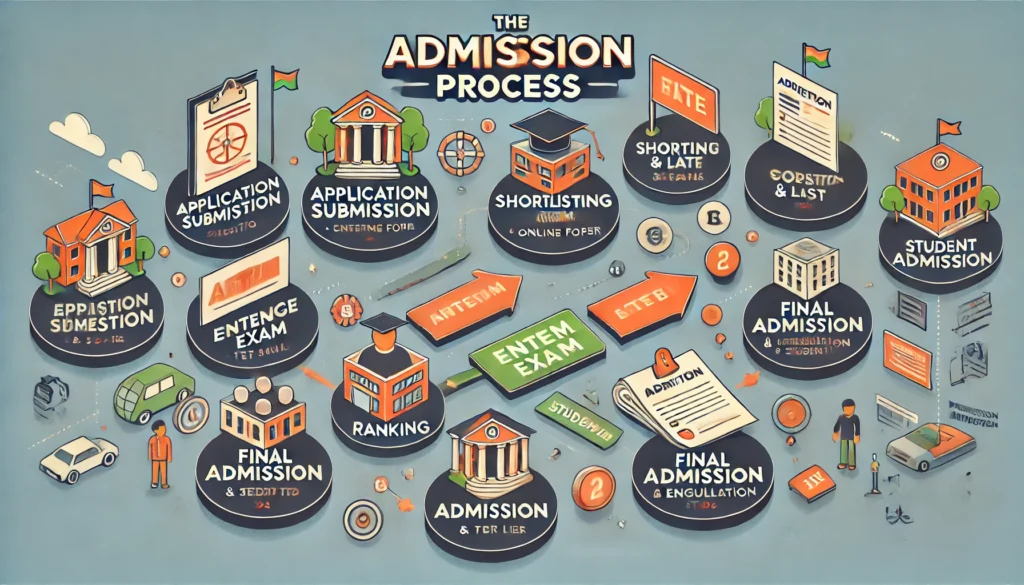Introduction
The Indian Institutes of Technology (IITs) are among the most prestigious engineering institutions in India. Every year, millions of students dream of getting into IIT, but only a few succeed. Admission to IIT is a challenging process that requires dedication, hard work, and a smart strategy. In this blog, we will explain the complete roadmap to help you secure admission to IIT in a simple and easy-to-understand manner. This guide will cover everything from understanding the admission process to effective preparation strategies, exam tips, and the final counseling process.
Step 1: Understand the IIT Admission Process

1.1 Entrance Exams
To get into IIT, you need to clear the Joint Entrance Examination (JEE). The exam is conducted in two stages:
- JEE Main: Conducted by the National Testing Agency (NTA), this is the first step. Qualifying JEE Main makes you eligible for JEE Advanced.
- JEE Advanced: Only students who clear JEE Main with a high rank can appear for JEE Advanced. Your performance in JEE Advanced decides your IIT admission.
1.2 Eligibility Criteria
Before starting your preparation, it is important to understand the eligibility criteria for IIT admissions. The key requirements are:
- You must have completed Class 12 with Physics, Chemistry, and Mathematics as core subjects.
- There is an age limit: candidates should be within a certain age range (usually 25 years for general category students, with relaxation for reserved categories).
- The number of attempts is limited: typically, students can appear for JEE Main twice in a single academic year and JEE Advanced only in two consecutive years after Class 12.
- Minimum percentage requirements in Class 12 vary each year, so check the latest guidelines on the official website.
Step 2: Start Early Preparation
2.1 When to Start?
- Class 9 & 10: Building a strong foundation in Mathematics and Science at an early stage is crucial. Focus on understanding fundamental concepts rather than rote learning.
- Class 11 & 12: These years are critical for JEE preparation. The syllabus for JEE Main and JEE Advanced is derived from Class 11 and 12 topics, so studying systematically is essential.
2.2 Coaching or Self-Study?
- Many students join coaching institutes like Allen, FIITJEE, Aakash, or Resonance for structured preparation. Coaching helps in clearing doubts and understanding complex topics with expert guidance.
- Some students prefer self-study with the help of online resources like NPTEL, YouTube, Unacademy, Vedantu, and reference books.
- A combination of both coaching and self-study can be highly effective.
Step 3: Follow a Strong Study Plan
3.1 Subject-Wise Preparation Strategy

Mathematics
- Focus on important topics such as Calculus, Algebra, Coordinate Geometry, and Trigonometry.
- Solve problems daily and refer to standard books like R.D. Sharma, S.L. Loney, and IIT Mathematics by M.L. Khanna.
- Regularly practice previous years’ JEE questions to understand the pattern.
Physics
- Core topics include Mechanics, Electricity & Magnetism, Optics, and Thermodynamics.
- Books like HC Verma, Irodov, and DC Pandey are recommended for conceptual clarity and problem-solving skills.
- Solve numerical problems consistently and focus on real-life applications of physics principles.
Chemistry
- Physical Chemistry: Understand chemical kinetics, electrochemistry, and thermodynamics. Books like P. Bahadur are highly recommended.
- Organic Chemistry: Master reaction mechanisms and named reactions. Refer to Morrison & Boyd and MS Chauhan for advanced problems.
- Inorganic Chemistry: Memorize periodic table trends, chemical bonding, and coordination compounds. NCERT is the best resource for this.
3.2 Daily Study Routine
- Dedicate at least 6-8 hours daily to studying, including solving practice questions.
- Divide time equally among Physics, Chemistry, and Mathematics.
- Maintain separate notebooks for formulas, theorems, and key concepts.
- Solve previous years’ question papers and take mock tests regularly.
Step 4: Practice and Revision
4.1 Solve Mock Tests
- Join test series to experience real exam conditions and improve time management.
- Analyze mistakes in mock tests and work on weak areas.
4.2 Revision Strategy
- Regularly revise important formulas, theorems, and concepts.
- Use flashcards or mind maps to retain key information.
- Make short notes for last-minute revision before the exam.
Step 5: Appear for JEE Exams
5.1 JEE Main
- Attempt all questions carefully and manage time efficiently.
- Practice online mock tests to familiarize yourself with the exam pattern.
- Aim for a high score to secure a place in JEE Advanced.
5.2 JEE Advanced
- Focus on problem-solving skills rather than theoretical knowledge.
- Attempt questions strategically, starting with the ones you are most confident about.
- Maintain accuracy to avoid negative marking.
Step 6: Participate in IIT Counseling
- Once you clear JEE Advanced, participate in JoSAA Counseling (Joint Seat Allocation Authority).
- Carefully choose your preferred IIT and branch based on your rank and interests.
- Lock your choices and complete the admission process, including document verification and fee submission.
Additional Tips for IIT Preparation

1. Maintain a Healthy Lifestyle
- Ensure proper sleep of 6-8 hours daily to keep your mind fresh.
- Eat a nutritious diet and exercise regularly to stay fit.
- Take short breaks while studying to improve concentration.
2. Stay Motivated
- Set small achievable goals and reward yourself upon completion.
- Surround yourself with positive influences, such as mentors, teachers, and like-minded peers.
- Visualize your success and stay focused on your dream.
3. Use Online Learning Platforms
- Platforms like Unacademy, Vedantu, BYJU’s, and PhysicsWallah offer valuable video lectures, doubt-solving sessions, and test series.
- Utilize free resources available on YouTube and government portals like SWAYAM and NPTEL.
4. Join Study Groups
- Discussing topics with fellow aspirants can provide new perspectives and help in better understanding.
- Participate in online forums such as Quora, Telegram groups, and Discord study communities.
Conclusion
Cracking IIT is tough but achievable with proper planning and dedication. Follow this roadmap, stay consistent, and you can make your IIT dream a reality. Hard work, perseverance, and smart study techniques are the keys to success. Remember, IIT admission is not just about intelligence but about strategy and execution. Keep pushing yourself, believe in your abilities, and you will succeed.


